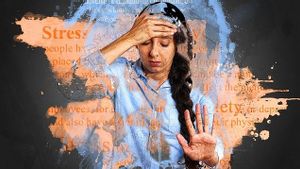JAKARTA - Depression is one of the most common types of mental disorder and affects more than 16 million adults in the United States, according to the National Institute of Mental Health.
This mood disorder causes a number of emotional symptoms, including persistent feelings of sadness and loss of interest in things you once enjoyed. Depression can also cause symptoms of physical health problems.
Depression can make you feel physically ill and cause symptoms such as fatigue, headaches, and aches in various parts of the body. Depression is more than just feeling sad and needs treatment.
Depression affects physical pain in a number of ways. According to health expert, Timothy J. Legg, PhD, PsyD, here are some symptoms of physical pain caused by depression.
Diarrhea, stomach pain, and ulcers
Did you know, the brain and digestive system are directly connected. Depression, anxiety, and stress have been shown to affect movement and contraction of the digestive tract, which can cause diarrhea, constipation, and nausea.
Emotions can also affect the production of stomach acid, so that when someone is stressed, the risk of peptic ulcers increases. There is some evidence that stress can cause or worsen acid reflux.
In addition, there is also an association between gastroesophageal reflux disease or GERD and anxiety. Depression has also been linked to irritable bowel syndrome.
Sleep disturbance
Sleep problems are also a symptom of depression. Indications include difficulty falling asleep or getting a lot of sleep, but not getting enough sleep. In fact, there are many links between depression and sleep problems. Depression can cause or worsen insomnia whereas insomnia can increase the risk of depression. The effects of sleep deprivation also worsen other symptoms of depression, such as stress and anxiety, headaches, and a weakened immune system.
Increased heart rate and blood pressure
Depression and stress are closely related and both have been shown to have an impact on the heart and blood pressure. Uncontrolled stress and depression can cause irregular heart rhythms, high blood pressure, and damage to the arteries. A 2013 study found that depression is common in people with uncontrolled high blood pressure. In addition, it is also mentioned that depression can interfere with blood pressure management.
Headache
According to the National Headache Foundation, 30 to 60 percent of people with depression experience headaches. Symptoms of depression, stress, and anxiety have been shown to cause headaches and tension. Depression can also increase the risk of recurring headaches with stronger intensity and longer duration.
Impaired immunity
Depression adversely affects the immune system in a number of ways. During sleep, the immune system produces cytokines and other substances that help the body fight infection. Lack of sleep, which is a common symptom of depression, interferes with this process, increasing the risk of infection and disease.
There is also evidence that depression and stress are closely related to inflammation. Chronic inflammation plays a role in the development of a number of diseases, including heart disease, type 2 diabetes, and cancer.
SEE ALSO:
The English, Chinese, Japanese, Arabic, and French versions are automatically generated by the AI. So there may still be inaccuracies in translating, please always see Indonesian as our main language. (system supported by DigitalSiber.id)


















